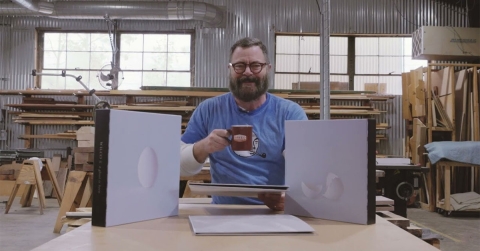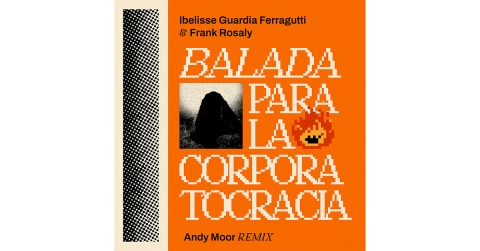Toumani and Sidiki, the new father-and-son recording from kora master Toumani Diabaté and his son Sidiki, is out now in North America. The Guardian calls it "the finest Toumani collaboration since his classic work with Ali Farka Touré." The Evening Standard calls it "a rare treat, one of the albums of the year." The Times of London says: "This album ranks among Toumani's best work." Toumani and Sidiki Diabaté will tour the United States this fall.
Mali’s Toumani Diabaté is widely recognized as the greatest living kora player. The Observer has deemed him “one of the world’s pre-eminent musicians in any genre.” Since recording the first solo kora album, in 1988, he has brought the instrument, a 21-string African harp, to the world with albums, tours, Grammy Awards and collaborations with the likes of Ali Farka Touré, Herbie Hancock, Damon Albarn and Björk, among others. Now he teams up with his eldedst son, Sidiki, for the father-and-son recording Toumani & Sidiki, which the Guardian calls “the finest Toumani collaboration since his classic work with Ali Farka Touré.” World Circuit releases the album in North America via Nonesuch Records today.
To pick up Toumani & Sidiki in North America, head to iTunes or the Nonesuch Store, where CD and vinyl orders include a download of the complete album at checkout; the album is also available to purchase there as MP3 and FLAC lossless files.
Toumani and Sidiki Diabaté will tour the United States this fall; for details, visit nonesuch.com/on-tour.
In the UK, where Toumani and Sidiki was released earlier this month, the album receives perfect five-star reviews from Songlines, the Evening Standard, which calls it "a rare treat, one of the albums of the year," and the Independent on Sunday, which calls it "gentle, majestic and graceful." The Independent named it Album of the Week, and the Times, giving it four stars, says: "This album ranks among Toumani's best work."
The ties binding Toumani and Sidiki Diabaté are profound and evocative. Toumani & Sidiki continues a staggeringly long line of Diabaté family musicians. Toumani and his son were born into a 71-generation, 700-year dynasty of griots, custodians of the ancient oral traditions of West Africa’s Mandé people. Indeed, the very names “Toumani” and “Sidiki” are significant in the annals of African music. Toumani’s father, Sidiki senior, recorded the first-ever kora album, the classic Mali: Ancient Strings, in 1970, unwrapping the instrument’s potential as a virtuosic lead instrument. Toumani has taken it further, weaving together bass lines, ancient melodies and astonishing improvisations to create a kaleidoscope of musical colors.
Sidiki, Toumani’s eldest son, moves things forward again. In Bamako, the 23-year-old is a star. Voted Mali’s best beat maker in 2013, Sidiki runs his own recording and programming studio and, with rapper Iba One, comprises the country’s premier hip-hop duo, which fills the 20,000-seat Modibo Keita stadium. At the same time, he has a deep knowledge of Mandé culture and a formidable technique on the kora. “It’s a dream to play with my father,” Sidiki says. “Yes, I’m a hip-hop artist, but I love and respect my roots as a kora player, I want to know more. It’s my chance to learn directly from my father. It’s extra special because my father is my idol.”
World Circuit’s Nick Gold produced Toumani & Sidiki with engineer Jerry Boys (Ali Farka Touré, Buena Vista Social Club, Orchestra Baobab), a longtime collaborator, and with Lucy Duran, producer of Toumani’s previous albums, as co-producer. The album is a set of unaccompanied kora duets, recorded live at London’s RAK studios with little rehearsal (for some tunes, no rehearsal) and no overdubs. The album was captured in stereo, so Toumani is heard in the left speaker and Sidiki in the right.
The repertoire is based on a combination of obscure, almost forgotten kora pieces and a new look at some Mandé classics from Mali. “We’re not going backwards, trying to play just how my father and grandfather did these songs,” says Toumani. “We have to do it our way. We’re modern griots, we live in the city, we’re connected to the world. Speaking of his desire to transmit ancestral repertoire in a contemporary manner, Toumani describes the album as “the past meets the present for the future."
The album arrives in the wake of the recent hardline Islamic insurgency that threatened a ban on music in the north of Mali. With this album, Toumani aims “to show the positive side of Mali,” to reassert the legacy of a country with access to untold musical riches. The songs are named, in griot tradition, to honor various people, places or events.
The playing is dazzling. Toumani and Sidiki communicate telepathically, finishing of each other’s musical sentences. The kora, often the quietest of instruments, is here played with verve, attack, groove, wit, swing, bounce, ecstatic excitement and exquisite intimacy—and always with a flowing pulse and groove.
- Log in to post comments



